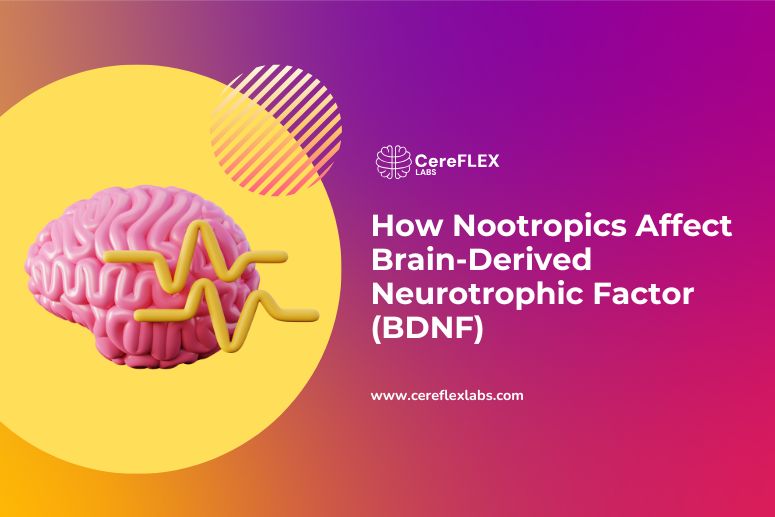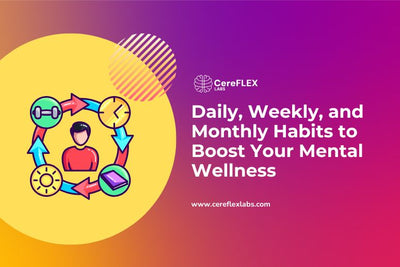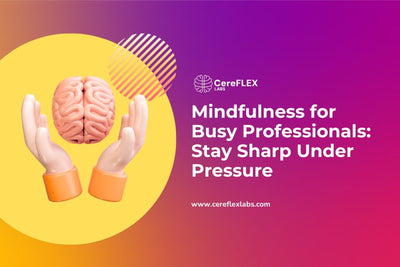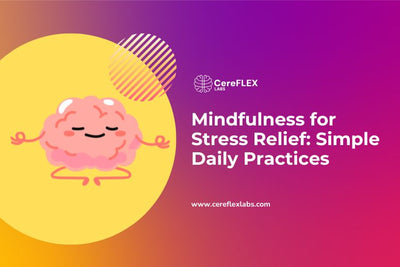Cognitive performance isn’t just about willpower—it depends on how well your brain can adapt, grow, and recover. At the heart of this process is Brain-Derived Neurotrophic Factor (BDNF), a vital protein that fuels neuroplasticity.
BDNF helps your brain form new connections, strengthen communication between neurons, and protect against fatigue and cognitive decline.
While lifestyle factors like sleep and exercise influence BDNF, some nootropics may directly enhance its production. Many of these are natural compounds that work with your brain’s own signaling systems—supporting sharper thinking, stronger memory, and better emotional resilience.
As interest in long-term brain health grows, BDNF is becoming a key target for those looking to stay mentally sharp and emotionally grounded.
Here is the Quick Answer |
|
BDNF (Brain-Derived Neurotrophic Factor) is a key brain protein that supports memory, learning, and emotional resilience. Low levels are linked to cognitive decline and depression. You can raise BDNF naturally through exercise, sleep, nutrient-rich foods, and exposure to sunlight—and with certain nootropics like Lion’s Mane, Rhodiola Rosea, L-Theanine, and Ashwagandha. Cereflex Labs’ AM/PM Protocol includes science-backed ingredients that support BDNF, helping you stay sharp, focused, and mentally resilient. |

What is BDNF and why does it matter?
Brain-Derived Neurotrophic Factor (BDNF) is one of the brain’s most important growth proteins. It supports the health and function of neurons—helping them grow, survive, and form new connections.
While BDNF is found throughout the body, it’s especially concentrated in the brain and central nervous system. It’s most active in areas like the hippocampus and prefrontal cortex—regions tied to learning, memory, and emotional balance.
BDNF acts as both a neurotrophic factor and a chemical messenger. It helps neurons stay strong while improving how they communicate with one another. The more active your BDNF pathways, the better your brain adapts to learning, stress, and change.
BDNF and Neuroplasticity
One of BDNF’s most critical roles is promoting neuroplasticity—the brain’s ability to rewire, learn, and recover.
BDNF helps neurons create new pathways and strengthen existing ones, which is essential for learning new skills, recovering from injury, and adapting to stress. It supports synaptic plasticity, a process where connections between neurons become more efficient with use.
Emerging research also shows that BDNF may play a role in repairing damage from neurological conditions like multiple sclerosis. Although more studies are needed, current findings suggest that BDNF enhances recovery by supporting neuron survival, growth, and remyelination.1
BDNF in Memory and Learning
BDNF plays a vital role in memory formation and learning by strengthening synaptic connections—especially in the hippocampus, a brain region responsible for long-term memory.
It activates cellular pathways that help neurons communicate more efficiently and build lasting networks, essential for storing new information.
However, the effects of BDNF are complex. Variables like its location in the brain, how it's processed, and whether it acts on excitatory or inhibitory synapses can influence outcomes. This complexity makes BDNF a powerful but challenging target for treating memory-related disorders.2

BDNF’s Role in Mood and Resilience
BDNF doesn't just support learning—it also helps regulate mood and emotional resilience. It does this by promoting healthy neuroplasticity in key areas of the brain like the prefrontal cortex, hippocampus, and amygdala—regions deeply involved in emotion processing and regulation.
When BDNF levels are low, often due to chronic stress or inflammation, the brain becomes less adaptable. This rigidity can lead to mood disorders such as depression or anxiety. On the flip side, higher BDNF levels are associated with greater stress resilience and better outcomes in mood disorder recovery.
BDNF also interacts with the neuroimmune system, helping to reduce maladaptive responses that contribute to mental health decline. That’s why many antidepressants and lifestyle therapies aim to restore healthy BDNF signaling—it’s a key piece of the brain’s emotional recovery puzzle.3 4
How BDNF Works in the Brain
BDNF is primarily produced in brain regions associated with memory, learning, and higher-order thinking—most notably the hippocampus, cerebral cortex, and amygdala. These regions rely on BDNF to maintain healthy neural communication and adaptability.
When released, BDNF binds to TrkB receptors (tropomyosin receptor kinase B) on neurons. This binding triggers a series of intracellular processes that:
- Stimulate the growth and survival of neurons
- Strengthen synaptic connections
- Support neurogenesis (creation of new neurons)
- Enhance synaptogenesis (formation of new synapses)
BDNF essentially acts as a fertilizer for your brain cells—nourishing them, encouraging them to connect in new ways, and protecting them from degeneration.
Positive Stress and BDNF Activation
BDNF is highly responsive to “positive stressors”—stimuli that challenge the brain and body in healthy ways. These include:
- Aerobic exercise: especially high-intensity or endurance-based
- Cognitive challenges: such as learning new skills or solving puzzles
- Mindfulness and meditation: which reduce stress hormones and improve emotion regulation
- Novel experiences: like travel, exposure to new environments, or creative exploration
These activities temporarily stress the brain, which in turn boosts BDNF expression and strengthens cognitive resilience over time.
➤ Important Note: Nutrition and targeted supplementation—especially with certain nootropics—can also stimulate BDNF, complementing these lifestyle strategies for a comprehensive approach to brain health.
Top Nootropics That May Boost BDNF
Certain nootropics show strong promise in supporting the production and activity of BDNF. These natural compounds work through various mechanisms—reducing inflammation, enhancing neurotransmitter balance, or stimulating pathways tied to neuroplasticity.
Here are some of the most evidence-backed nootropics linked to BDNF enhancement:
1. Lion’s Mane Mushroom (Hericium erinaceus)

Lion’s Mane promotes nerve growth and cognitive resilience. Compounds like NDPIH and hericene A encourage axon outgrowth and branching in the hippocampus—where BDNF is most active.
These effects remain even without external growth factors, suggesting lion’s mane stimulates intrinsic repair and regeneration processes.
Animal studies show it increases neurotrophin expression, enhances memory, and may support learning by acting through BDNF-linked pathways.5
2. Rhodiola Rosea

Rhodiola rosea is an adaptogenic herb known for reducing mental fatigue and improving stress resilience. Its active compounds reduce oxidative stress, restore mitochondrial energy function, and increase BDNF levels—even under stressful conditions.
It also promotes neurite outgrowth, improving neural communication. For people under chronic stress, Rhodiola may support both mood and cognitive performance by preserving BDNF signaling.6
3. L-Theanine

L-theanine, an amino acid found in green tea, has calming effects without sedation. In a controlled human study, daily supplementation improved anxiety and mood symptoms—changes that correlated with increases in BDNF levels.
These results suggest that part of L-Theanine’s emotional and cognitive effects may be mediated by improved neuroplasticity via BDNF.7
4. Ashwagandha

Ashwagandha supports brain resilience under chronic stress. Research shows that its withanolide-rich root extract restores normal BDNF signaling pathways in brain cells exposed to stress hormones.
In animal studies, it reversed behavioural and molecular stress damage—indicating its potential to improve mood and support long-term cognitive function by modulating BDNF.8
5. Bacopa Monnieri

Bacopa is a traditional Ayurvedic herb long used for memory and learning. In rodent studies under chronic stress, Bacopa supplementation preserved BDNF levels in the hippocampus and cortex.
It also reduced depression-like behaviours, suggesting its mood benefits are at least partially linked to its ability to restore BDNF and promote brain adaptability.9
How can I naturally increase BDNF?
Nootropics can boost BDNF—but they work even better when paired with supportive lifestyle habits. These daily behaviours not only amplify supplement effects but also help your brain produce and use BDNF more efficiently over time.
Below are science-backed strategies to naturally support BDNF levels and long-term brain performance.

1. Exercise: The Best Brain Booster
Physical activity is one of the most powerful ways to increase BDNF.
High-Intensity Interval Training (HIIT) elevates both BDNF and lactate, improving neuroplasticity.
Moderate aerobic workouts like running, swimming, or dancing consistently raise BDNF in older adults and support memory.
Resistance training also boosts BDNF—particularly when it focuses on compound movements and progressive overload.
The key is consistency. Aim for a mix of cardio and strength work throughout the week.
2. Heat Therapy: Saunas and Hot Baths
Exposure to high temperatures via sauna use or hot baths increases BDNF and supports brain recovery.
Heat promotes protein activity that mimics mild stress, prompting a protective BDNF response.
Sauna sessions 2–3 times weekly are associated with reduced dementia risk, possibly due to enhanced neurotrophic activity.10
Try incorporating brief heat exposure after workouts or on rest days.
3. Diet: Fuel Your Brain
What you eat directly impacts BDNF production. Focus on foods that reduce inflammation and support neurotransmitter synthesis:
✔ Omega-3 fatty acids (from fatty fish or algae) enhance BDNF and protect neurons.
✔ Protein-rich meals supply amino acids needed to make neurotransmitters and brain repair proteins.
✔ Polyphenols from blueberries, green tea, and dark chocolate activate BDNF via antioxidant mechanisms.
✔ Coffee fruit extract, a unique compound found in some nootropics, has been shown to raise BDNF levels significantly in clinical trials.
Avoid processed foods, trans fats, and high-sugar diets, which are known to lower BDNF.
4. Mental Engagement: Meditate & Learn
Keeping your brain stimulated supports BDNF in cognitive regions like the hippocampus:
- Meditation helps regulate emotional reactivity and stress, both of which affect BDNF.
- Learning new skills—languages, instruments, or even video games—encourages synaptic growth.
- Mindfulness practices, like deep breathing or journaling, improve self-regulation and may help sustain higher BDNF levels over time.
Aim to engage your mind with novelty, challenge, and focus regularly.
5. Gut Health: Feed Your Microbiome
Your gut and brain are more connected than they might seem. The gut microbiome helps regulate inflammation, neurotransmitters, and even BDNF production.
- Certain probiotic strains like Lactobacillus plantarum have been shown to increase serum BDNF levels and improve mood and cognitive function.
- Prebiotic fibres from foods like oats, bananas, and garlic help maintain a diverse and healthy gut flora, which supports better brain signaling.
- Fermented foods (e.g., kefir, kimchi, yogurt) may also encourage the growth of beneficial bacteria that modulate neurochemistry.
A well-fed, diverse gut supports brain health from the inside out.
6. Sunlight, Fresh Air, and Social Connection: Environmental and Emotional BDNF Boosters
Spending time outdoors and maintaining strong relationships can also affect BDNF levels positively.
- Sunlight exposure increases vitamin D levels, which are associated with higher BDNF expression. Even brief exposure to morning light can help reset circadian rhythms and enhance cognitive performance.
- Clean air improves exercise outcomes. In contrast, studies have found that air pollution can reduce BDNF levels and impair cognition.
- Social interaction reduces depression and loneliness—both linked to low BDNF—and stimulates emotional resilience.
Small daily habits like walking outside, reducing screen time, or calling a friend can subtly support brain growth and mood regulation.
7. Strategic Fasting and Carb Restriction: Metabolic Levers for BDNF
Certain dietary practices influence BDNF through shifts in metabolism.
- Intermittent fasting (16–24 hours) has been shown to elevate BDNF by activating stress-adaptive cellular pathways that promote brain resilience.
- Low-carb or ketogenic diets increase ketone bodies like beta-hydroxybutyrate (BHB), which may upregulate BDNF expression in the hippocampus.
- Time-restricted eating aligns food intake with circadian rhythms, possibly improving BDNF-sensitive pathways like AMPK and SIRT1.
These approaches aren't for everyone and should be customized to your health status—but they offer promising tools for cognitive longevity.
8. Sleep and Stress Management: Habits for Brain Health
Chronic stress and poor sleep are two of the biggest suppressors of BDNF.
- Sleep deprivation reduces BDNF levels in key areas like the hippocampus and prefrontal cortex. Aim for 7–9 hours of consistent, good-quality sleep.
- Stress management practices like breathwork, yoga, and mindfulness meditation increase parasympathetic activity and help restore neurotrophic balance.
- Limiting stimulants and setting consistent wind-down routines also improve sleep architecture and BDNF regeneration overnight.
Supporting rest and recovery helps BDNF do its job: building a brain that’s adaptive, stable, and resilient.
Are there any risks or considerations?
BDNF-boosting nootropics and lifestyle strategies are promising tools for enhancing brain health, but they aren’t risk-free. Being informed about how to use them safely can help you avoid unwanted side effects and make the most of their benefits.
Choose Quality Supplements
Not all supplements are created equal. Some contain low-grade ingredients, ineffective doses, or unnecessary fillers.
Look for third-party testing and clinical dosages.
Brands like Cereflex Labs formulate with research-backed ingredients and transparent sourcing.
Avoid blends that hide ingredient amounts behind proprietary formulas.
Investing in quality ensures you’re supporting—not stressing—your brain.
Start with a Low Dose
Your brain chemistry is unique. A supplement that works for one person may be too strong for another.
Begin with the lowest effective dose, especially for potent nootropics like Lion’s Mane or Rhodiola.
Observe how your body responds over several days—note any changes in mood, focus, sleep, or digestion.
Increase slowly, only if needed.
This approach helps avoid overstimulation or unexpected side effects.
Be Aware of Medication Interactions
Nootropics that affect neurotransmitters or hormone levels can interact with medications for depression, anxiety, blood pressure, or thyroid function.
If you’re on prescription meds, especially SSRIs, stimulants, or sedatives, consult your doctor or pharmacist before introducing a new supplement.
Even natural compounds like Ashwagandha and Bacopa can alter how your body metabolizes certain drugs.
Safety always comes first when combining supplements with medications.
Know That BDNF Takes Time
Raising BDNF isn’t a quick fix—it’s more like building a habit.
While some may feel early benefits like clearer thinking or better mood in a few weeks, full improvements often take months of consistency.
Think of BDNF enhancement as brain training: gradual, cumulative, and lasting.
Don’t chase short-term spikes—aim for sustainable gains through long-term support.
When combined with a healthy lifestyle, nootropics can amplify your efforts and help your brain grow stronger with time.
How Cereflex Labs Supports BDNF Optimization
At Cereflex Labs, our mission is to support long-term brain health—not just quick fixes. Our AM/PM Protocol is specifically designed to align with the body’s natural rhythms and enhance functions associated with BDNF, neuroplasticity, and cognitive resilience.
AM Formula: Brain Morning Support
Start your day with clean, focused energy. The AM formula is crafted to:
✔ Promote mental clarity and sustained concentration
✔ Support working memory and learning processes
✔ Enhance blood flow to the brain for oxygen and nutrient delivery
✔ Provide antioxidants to protect against oxidative stress
Ingredients include well-studied nootropics and adaptogens known to influence BDNF pathways and support daily cognitive demands.
PM Formula: Cognitive Evening Support
Nighttime is when the brain restores itself. The PM formula helps:
✔ Calm the nervous system without sedation
✔ Reduce inflammation and oxidative damage
✔ Support neurogenesis and synaptic repair
✔ Enhance sleep quality and resilience under stress
With neuroprotective ingredients like Choline Alfoscerate (Alpha-GPC), Magnesium Threonate, and L-Theanine, the PM blend works in sync with your circadian biology to rebuild and recharge brain function.
Trusted, Research-Backed Formulas
What sets Cereflex Labs apart:
✔ Clinically relevant dosing: Based on the latest neuroscience and nutrition research
✔ Targeted delivery: Ingredients matched to morning and evening use for optimal effect
✔ Quality assurance: Manufactured in certified facilities with third-party testing
If your goal is to improve cognitive performance, protect your brain, and support BDNF consistently—the AM/PM Protocol offers a complete, streamlined solution.
Conclusion
Brain-Derived Neurotrophic Factor (BDNF) is one of the most important molecules for long-term brain health. It fuels learning, memory, emotional resilience, and the brain’s natural ability to grow and adapt.
Low BDNF is associated with cognitive decline, depression, and poor stress tolerance. But with the right approach—consistent habits, daily movement, targeted nootropics, and restorative sleep—you can support your brain’s natural regenerative power.
Nootropics like lion’smMane, Rhodiola, and L-Theanine can enhance BDNF activity, especially when paired with lifestyle changes like aerobic exercise, meditation, and clean nutrition.
At Cereflex Labs, we’ve built our AM/PM Protocol around this philosophy—supplying your mind with the tools needed to perform day and night. With science-backed ingredients and timing-aligned formulas, you can fuel productivity by day and repair by night.
Invest in your brain—because better BDNF means better thinking, better mood, and a more adaptable mind.






